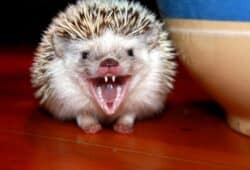Do you want to know more about hedgehog pet dental care?
On one of my vet visits, I observed a one-year-old female hedgehog at the veterinarian clinic with all of her teeth covered in a brown crust. When the hedgehog began to resist meals and lost a lot of weight, the owners got concerned. They were appalled when the veterinarian showed them the hedgehog’s teeth. They never felt the need to inspect its teeth, and they did not believe that tartar on all teeth could affect their pet’s health. That was an eye-opener for me and will like to share what I learned
Here we go,
What Is The Number Of Teeth On A Hedgehog Pet
Hedgehogs, like other mammals, have 34 to 44 teeth. However, because hedgehogs, like humans and dogs, are diphyodonts: having temporary teeth initially and permanent teeth replacing them, they do not have 44 complete teeth when they are born. Hedgehogs have 36 teeth, with 3/2 incisors and 7/5 canines. The upper jaw has 20 little sharp teeth while the lower jaw has 16 small sharp teeth. The top incisors are widely spread, allowing the lower incisors to bite. The two internal incisors in the upper and lower jaws are quite long; the fangs are indistinguishable; and five of the top molars.
Do Hedgehog Pet’s Teeth Fall Out
Hedgehog loses their milk teeth after about 8 weeks. According to statistics, 80% of all four-legged buddies over the age of three have dental issues. Hedgehogs often develop baby teeth around the second or third week of life. When they are 7-9 weeks old, their baby teeth start to fall out and new, permanent ones emerge.
Diphyodont animals which hedgehog is an example has temporary teeth throughout their juvenile period then lose them and replace them with permanent teeth when they reach the appropriate age. It is essential to remove soft plaque yourself regularly so that tartar and bacteria have no opportunity. Only a veterinarian can remove tartar that has already developed.
If bacteria colonize your hedgehog’s mouth, they attack the gums and generate gum pockets where germs can grow. This causes receding gums and jaw bones, and in the worst-case scenario, teeth fall out
Do Hedgehogs Need Their Teeth Cleaned
Yes, Hedgehogs need their teeth cleaned. This can be achieved by brushing your hedgehog’s teeth. However, your hedgehog must have been trained to use it as a baby. Some mature hedgehogs may tolerate cleaning their teeth with special toothpaste with a little effort. In reality, you can only use a wet-specific toothbrush and toothpaste in hedgehog-friendly tastes to make the procedure rather simple. Human toothpaste and mouthwash might be hazardous to your pet so do not use them
Try using a damp Q-tip to gently massage all of your pet’s teeth is also helpful. Concentrate on the rear molars and the visible side of the teeth. Be kind and don’t stress your hedgehog. Don’t be alarmed if your gums begin to bleed slightly. This indicates that they are not used to being brushed.
How Do You Take Care of A Hedgehog’s Teeth
A comprehensive dental inspection during yearly veterinarian appointments, as well as frequent dental cleanings under anesthesia, is suggested for hedgehogs to avoid tooth loss or other dental disorders. Some hedgehog owners wash their hedgehog’s teeth once a week using cat toothpaste and a small-headed toothbrush or cotton-tipped applicator. Their tiny teeth may then be cleaned, polished, and x-rayed. Teeth that are causing problems may need to be removed. This is the same treatment used on cats, dogs, and other teeth-bearing pets, however, there is a danger of anesthetic while your pet is sedated. Before the surgery, a veterinarian should be consulted regarding screening blood and intravenous fluids to guarantee the best possible dental prophylaxis.
Hedgehog Teeth Cleaning Toys is another way to take care of your hedgehog teeth. Dental toys are also a great aid in dental maintenance. It works to strengthen the jaw muscles, massage the gums, and polish the teeth of your hedgehog. Hard rubber toys provide the same cleaning function as well as being entertaining.
Hedgehog Teeth Problems
Dental Plaque, Tartar, And Calculus On Hedgehog Teeth
These three things are what your veterinarian might call the black or brown stuff on your hedge’s teeth. Plaque is a soft coating on the teeth which forms at the start of the vicious circle. Plaque is made up of saliva, food particles, and bacteria created by eating the incorrect foods, leaving food on the teeth, and bacteria that accumulate in them. The minerals in saliva convert plaque to tartar.
This is a problem because it makes the teeth unhealthy and sits on the gum line. The gum line is a direct route to your hedgehog’s blood supply, bringing bacteria to all major organs in the body. A large accumulation of one of these three things can lead to systemic infection in your hedgehog. You can usually rub off softer plaque, but usually, tartar is too hard to grind away without a professional cleaning.
Hedgehog Root Abscesses
A tooth root abscess occurs when the root of a tooth (which cannot be seen without an x-ray on a healthy tooth) develops a pocket of pus in your hedgehog’s mouth. This is caused by a severe tooth infection and can occasionally produce a protrusion beneath the hedgehog’s eye on the side of the face where the infected tooth is. This protrusion may resemble a pimple and might form fast. If you see such a lump or any other bumps on the hedgehog, please kindly consult a veterinarian as soon as possible. You’ll need to pull a problematic tooth, clean the remaining teeth, and give your hedgehog strong pain relievers and antibiotics.
Signs To Know Your Hedgehog Pet Has Teeth Problem
- The hedgehog starts eating less.
- Refusal to consume solid foods.
- There is an odor from the mouth
- Weight loss
- Tooth discoloration
- Plaque formation
- Gum inflammation and redness
- Swelling of jaw
- Excessive salivation
- Symptoms of periodontitis which is a disorder that can cause pain and suffering in animals, as well as tooth loss
How To Prevent Hedgehog Dental Problems
- Taking care of the hedgehog’s nutrition is the greatest method to avoid such issues which you can see in my post What Do Hedgehog Pets Eat And Drink . The best approach to provide the animal with everything it requires while also keeping its teeth in good shape is to change the meals in its diet, rotating between raw, soft, and dry foods.
- At least every other day, toys and bones can be used to mechanically clean your pet’s teeth. These toys and bones stimulate the gums and help break down plaque, which can aid in the prevention of dental disease
- Brushing your pets’ teeth regularly to fight against plaque
- An adequate amount of roughage must be provided to the hedgehog
- Consult your veterinarian as least once yearly which is a preventative inspection
Conclusion
Dental care of pets makes them more comfortable and happy. Remember that your pet’s teeth are a vital component of its health, and good dental care should be part of your normal pet care routine. The condition of an animal’s teeth and gums is crucial to its general health and well-being. However, many pet owners overlook this issue and do not pay enough attention to their pets’ dental health. I invite you to read my post on How Long Do Hedgehog Pet Live, which will provide you with the finest advice on how to give your pet a long life.

